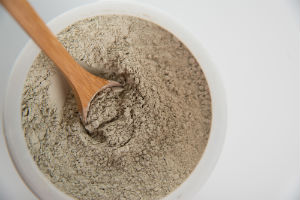6 Health Benefits of Bentonite Clay |  |
| 6 Health Benefits of Bentonite Clay Posted: 23 Aug 2014 08:00 AM PDT  Bentonite clay has been traditionally used for its strong internal cleansing properties and has become a popular ingredient in some detoxification programs. Many people have used bentonite clay to address symptoms of constipation, like bloating and gas. Some have even cited it as relieving symptoms of more serious gastrointestinal conditions, like Irritable Bowel Syndrome. Research has also revealed its role in protecting the immune system and combating the effects of various toxins present in the environment.
Six Health Benefits of Bentonite ClayBentonite clay has been used for centuries, and research is slowly building on its possible role in protecting human health. As a detox tool, bentonite clay may be helpful for reducing dietary and environmental toxins, improving the immune system, and aiding in fluoride removal from drinking water. Here are some of the researched benefits of bentonite clay. 1. Removes FluorideOne study found that bentonite clay, when combined with magnesium chloride, successfully reduced fluoride contained in fluoridated water. This may provide hope for the development of a natural filtration technique in the future, especially considering the rising concern of fluoride on human health. [1] 2. Combats Dietary ToxinsAflatoxin is a type of mold-like compound produced by organisms that thrive on a variety of different food crops. These toxic substances are detectable in peanut butter and some cooking oils, and research shows that they can interfere with the functioning of the immune system. [2] Aflatoxins may also contribute to possible liver damage, including liver cancer. [3] Animal models have shown that bentonite clay may reduce health damage associated with the ingestion of dietary aflatoxin. [4] 3. Fights Environmental ToxinsVolatile organic compounds (VOCs) is a term describing an assortment of chemicals emitted from cleaning supplies, paint, office equipment, permanent markers, pesticides, building materials, and hundreds of other everyday items. Breathing in these compounds is commonplace for many people, as indoor paints often contain many of these health-damaging chemicals. Bentonite clay has been shown to adsorb VOCs, possibly reducing human exposure to these dangerous compounds. [5] [6] Determining the proper application of bentonite as a VOC-reducing agent is still being researched. 4. Heavy Metal CleansingBentonite clay is typically used for cleansing the body of heavy metals, compounds that may degrade the health of the body over time. The most damaging heavy metals are mercury, cadmium, lead, and benzene, compounds contained in some processed foods (especially those with high fructose corn syrup), drinking water, building materials, and the environment. [7] One study has revealed that bentonite clay may be helpful for reducing these harmful metals, yet further studies on human health have yet to be conclusive. [8] 5. Cleans Contaminated SoilSoil near busy highways or roads can often be contaminated with a variety of heavy metals, pollutants, and toxic chemicals. Much of the contamination in soil has been built up for decades, and many of these chemicals can interfere with the quality of the soil and crop production. Organic chemical compounds, like benzene, toluene, and xylene, are often found in contaminated soil. These aromatic chemicals are carcinogenic, and exposure to them over time can lead to negative health effects. [9] Bentonite clay may be helpful for reducing soil contaminates by acting as an amendment to chemically-adulterated soil. [10] 6. Immune SystemBentonite clay has been shown to be protective against agents responsible for reducing the effectiveness of the immune system, and animal models show that bentonite clay may be a possible immune system strengthener. In one study, broiler chickens were fed food containing aflatoxins to test their immune response. Aflatoxins seemed to initiate unfavorable effects in the immune system, an action that can increase the animals' predisposition to a number of diseases. Following the administering of bentonite clay, the aflatoxins' immune-degrading effects were significantly suppressed. [11] Why is Bentonite Clay Effective?Bentonite clay has negatively charged molecules, which seems to enhance its adsorptive properties. It’s able to pass through the intestinal tract and attract the toxins which are positively charged. When they are in contact with each other, they swap ions and are bound together and the toxic molecule is absorbed by the clay molecule. Its absorptive abilities come from the low number of minerals–17, to be exact–that comprise the bulk of the product. This low number indicates a higher potential to absorb other molecules. The toxin molecules that bonded with the clay molecules are internalized in the clay molecule. In this state, your body supposedly expels the toxin-filled clay through normal bowel movements. Bentonite Clay CautionsBentonite clay is powerful and effective. Using bentonite clay in accordance with instructions seems to be safe, but you should always consult a healthcare professional to assess your individual needs. Clay may be an irritant to the lungs for some people, so individuals should avoid inhaling the product. -Dr. Edward F. Group III, DC, ND, DACBN, DCBCN, DABFM References:
The post 6 Health Benefits of Bentonite Clay appeared first on Natural Health & Organic Living Blog. |
| You are subscribed to email updates from Natural Health & Organic Living Blog To stop receiving these emails, you may unsubscribe now. | Email delivery powered by Google |
| Google Inc., 20 West Kinzie, Chicago IL USA 60610 | |
No comments:
Post a Comment